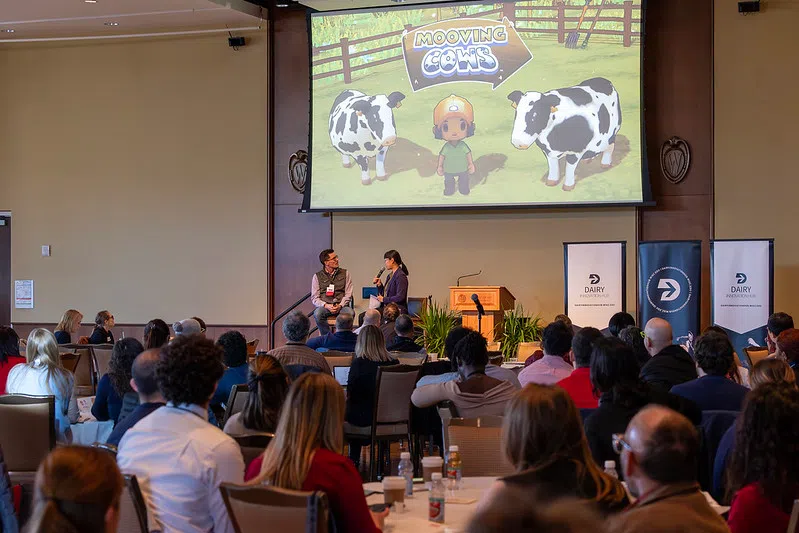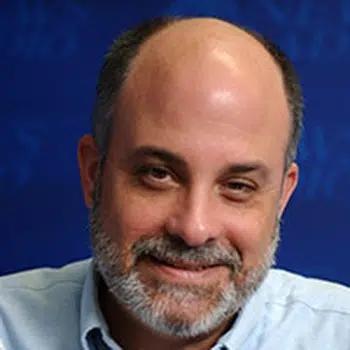The Dairy Innovation Hub held its fifth annual Dairy Summit on Wed. Nov. 20 on the UW–Madison campus. Through poster sessions, research presentations and panel discussions, the summit highlighted examples of the latest Hub-funded research taking place at UW–Madison, UW–Platteville and UW–River Falls to help meet the challenges facing today’s dairy community.
The event was attended by 200 or so legislators, researchers, campus affiliates, students, dairy professionals and farmers. Another 100 people attended the event virtually. The summit featured a special appearance from Gov. Tony Evers, who praised the collaborative efforts of the three universities. State officials who attended include Rep. Travis Tranel, Rep. David Considine, and Department of Agriculture, Trade, and Consumer Protection Secretary Randy Romanski.
The Dairy Innovation Hub, funded through a $7.8-million-per-year investment by the state of Wisconsin, harnesses research and development on the Madison, Platteville and River Falls campuses, ensuring that Wisconsin’s $52.8 billion dairy community remains a global pacesetter. Since its launch in 2019, the Hub has funded 230 projects and 19 faculty positions across the three campuses.
During welcome remarks, UW–Madison Chancellor Jennifer Mnookin said the collaboration and innovation the Hub provides is “something we can all celebrate.”
“It’s really hard to imagine any better example of the Wisconsin Idea in action,” Mnookin said. “We want to be a model for the world in dairy innovation and discovery.”
UW–Madison College of Agricultural and Life Sciences Dean Glenda Gillaspy said the Hub research projects provide “big ideas to solve big problems.”
The summit kicked off with 34 posters featuring the diversity of Hub-funded research. The posters focused on the Hub’s four priority areas – enriching human health and nutrition; ensuring animal health and welfare; growing farm businesses and communities; and stewarding land and water resources.
University researchers, graduate students and farmers presented their preliminary findings on nine research projects during the opening panel and research introductions.
Jennifer Van Os, an assistant professor and extension specialist in the UW–Madison Department of Animal and Dairy Sciences and Jordan Matthews, a partner at Rosy-Lane Holsteins near Watertown, outlined the development of a video game that helps farm workers improve their animal-handling skills. “Mooving Cows” has so far been downloaded 14,000 times in more than 100 countries. Matthews was one of the farmers Van Os relied on for feedback as the video game was being developed.
“Most everybody has a phone, plays on a phone, is distracted by a phone, so let’s give them a training tool on their phone,” he said. The owners at Rosy-Lane have integrated the game into the training programs for the 30 employees on their two dairy farms.
“Some people we onboard have zero experience on a farm,” Matthews said. “(The video game) might get the light bulb to click on a little faster.”
Grace Lewis, an assistant professor and Hub-funded faculty in the UW–River Falls Department of Animal and Food Science, outlined her research project on the feasibility of manufacturing and marketing lactose-free ice cream. Lewis said nearly 65 percent of the world’s population is lactose intolerant – with particularly high levels in Africa and Asia – so promoting lactose-free ice cream could open new markets for Wisconsin dairy farmers.
“What we’re really trying to answer is whether consumers will pay more for lactose-free ice cream,” Lewis said. An experimental auction using a unique bidding process and real ice cream samples will determine if consumers would be willing to pay more for the product.
Tranel, who also owns and operates a dairy farm near Cuba City, said the study on lactose-free ice cream could be a game changer for the Wisconsin dairy industry.
“I see a lot of diversity in the (Hub) projects, and that’s good, because you never know which one is going to hit. For example, the whole lactose thing, I can see where that could do for Wisconsin what ethanol has done for Iowa.”
Other research presentations focused on nutrient management planning; childcare for farm families; climate change policy and food behavior; extending the squeakiness of cheese curds; an online course on udder health; evaluating male-female post-secondary education enrollment ratios in dairy-related programs; and understanding the impact of dry-off on dairy cow welfare using automatic milking systems.
Tom Crave, a dairy farmer from Waterloo, said he is encouraged by the progress reported by the researchers at the summit.
“I think the Hub has really given dairy research in Wisconsin a needed boost. It appears they’re doing a lot of research that can be transferred back to agriculture and the dairy industry.”
After lunch, the summit transitioned to two high-impact tour opportunities showcasing Hub investments at the Arlington Agricultural Research Station and in UW–Madison campus research facilities.
At Arlington, visitors experienced several unique tour stops including equipment used to measure methane emissions from cows breath; specialized gates used in feed efficiency research; artificial intelligence and machine learning for animal health and welfare; a beef x dairy cross calf area; and a lysimeter network used for long-term water quality monitoring.
“There are some exciting research opportunities at these facilities. I was especially interested in the calf projects being explored using the new calf barn,” said Andy Bohnhoff who attended the tour and has worked both in veterinary medicine and dairy nutrition consulting.
The calf barn at Arlington was configured in an existing underutilized space at the beef-grazing unit with calf panels, feeding equipment and building supplies funded by the Hub.
On campus, visitors viewed equipment in Babcock Hall used to develop value-added dairy products. The group then moved to the Dairy Cattle Center to learn about a current research study involving dairy cow/calf pairs. The last stop on the campus tour was at the Meat Science and Animal Biologics Discovery building to learn more about research on meat quality from dairy/beef crossbred animals.
Alumnus Andy Buttles, of Stone-Front Farm near Lancaster, commented on how impressive the new facilities are compared to how they were when he was a CALS student, and he noted how they have been wonderful resources for programs his own children have participated in at UW–Madison.
Video recordings of the Dairy Summit sessions can be watched on the Hub’s YouTube channel at https://www.youtube.com/@






Comments